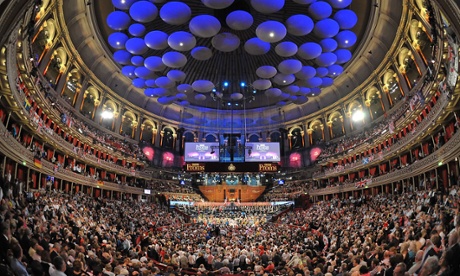
The First Night of the Proms starts – well, after the rip-roaring high spirits of Carl Nielsen’s Maskarade Overture – with the first performance of a new piece by Gary Carpenter, Dadaville, named after the sculptural painting by Max Ernst. Carpenter is one of the most winningly and thrillingly versatile composers: he’s worked on the score for The Wicker Man, has written musicals admired by Stephen Sondheim, and has composed an impressive catalogue of orchestral, chamber, and vocal works. Having had a sneak preview of it, his Proms commission seems like a teemingly imaginative and ebullient score, shot through with moments of satisfying strangeness and surreal changes of pace, texture and tune, all within just a few minutes. According to Carpenter, the piece imagines what might lie behind the weird and oppressive gates of Ernst’s picture (Ernst used cork to make them, but they give an impression of iron-hewn solidity). He reveals a musical clue just before the end of the piece about what lurks on the other side of Dadaville, but we’ll have to wait until Friday night to discover what that might be.
In the spirit of this First Night novelty, and honouring the long tradition of new music at the Proms (which is bound into their creative raison d’être, as espoused by Henry Wood, who confidently introduced “novelties” alongside the wider classical repertoires to his audiences) here are some personal highlights from the history of the Proms’ relationship with new music, in six pieces which were all premiered at the festival.
Arnold Schoenberg - 5 Orchesterstücke op 16
Schoenberg’s expressionist masterpiece was given its first ever performance by Henry Wood in 1912, who told his uncomprehending players: “This is nothing to what you’ll have to play in 25 years’ time.” But Wood proved the strength of his advocacy of Schoenberg’s piece by playing it again in the 1934 season – 22 years later.
Peter Maxwell Davies - Piano Concerto & Worldes Blis
Music that shocked and appalled some of its audience at its premiere in 1969 (some of whom walked out in protest) but whose large-scale expressivity now seems utterly compelling.
John Tavener - The Protecting Veil
In 1989, John Tavener’s cello concerto was a seismic moment in the composer’s life, and marked a moment when new music achieved a rare and justified popularity with a wider audience during Steven Isserlis’s performance.
Harrison Birtwistle - Panic
The controversy of Harrison Birtwistle’s work for saxophone, drumkit, winds and brass has become something of a myth in Proms history. Nonetheless, this music of uncompromising wildness and violence amid the celebrations and traditions of the second half of the Last Night of the Proms in 1995 showed the Proms’ power to disturb and upset in creatively positive ways.
Judith Weir - Moon and Star
Judith Weir’s choral cantata, setting a poem by Emily Dickinson and premiered in 1995, is one of her masterpieces, managing to say more in its 15 minutes than more grandiloquent choral works say in a couple of hours. Music of haunting yet utterly direct poetic power.
James Dillon: Violin Concerto
In 2000, violinist Thomas Zehetmair unveiled Dillon’s concerto, and it’s a performance I won’t forget. It’s a piece that creates a world of violent yet lyrical modernism in which the gestures of folk fiddling and melodies are transformed into something elementally powerful.

